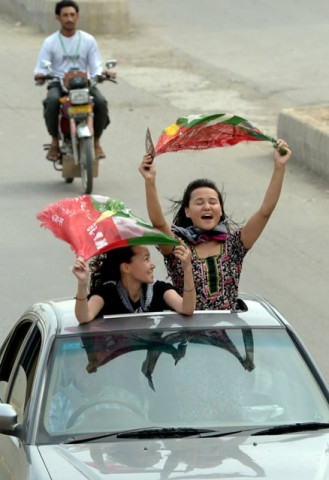Changing political landscape: K-P’s desire for change allows another party to try its luck
PML-N misses out on securing strong position on even-playing field.

On May 11, 2013, the PTI’s tsunami was enthusiastically embraced by the people of the province. PHOTO: AFP
The Qaumi Watan Party (QWP), though yet to expand its presence in most areas of the province, won seats from Charsadda, an ancestral ANP region, ringing in new bells of nationalist politics.
K-P’s mantra of change
Continuing with the tradition of giving newcomers an opportunity, the people of K-P have opted for the PTI to lead them with the party’s candidates remaining triumphant in districts as far north as Chitral as well as in the southern areas of Karak and Hangu.

In 2002, the province allowed the Muttahida Majlis-e-Amal (MMA) into power after being promised a reaction to the increasing American presence in the region. As time went on, however, militants continued to plague the province and inhibit the free spirit of the people.
In 2008, the winds of change gave power to the ANP and PPP with the hope that the two parties would put an end to militancy and set the region on the path of development. Despite the ANP taking on the militant threat, K-P found itself overwhelmed by the increasing intensity of bomb blasts and suicide attacks, further plunging the region into a war-like situation.
On May 11, 2013, the PTI’s tsunami was enthusiastically embraced by the people of the province in numbers greater than anywhere else in the country. In the process of ‘change’, people are once again searching for better prospects in life. The problems at hand include deteriorating law and order, infrastructural development and corruption.
Parties in political decline
The ANP and PPP in particular were haunted by militant threats during their electioneering activities, leaving them unable to carry out public campaigns. This was accompanied by the the provinces’ rejection of the parties’ policies during their tumultuous tenure.
On the other hand, the PML-N could not match the PTI either. Despite never being ‘perturbed’ in its campaign, in the end it could not deliver, much to the dismay of party chief Nawaz Sharif. Except for Sardar Mehtab Khan Abbassi, all candidates from the party’s central leadership lost their constituencies.

In K-P, internal rifts and divisions in the party, which were particularly exacerbated with Muqam’s induction, contributed to the party’s loss at the provincial level.
Power redistributed
The Jamaat-e-Islami succeeded in the polls by winning seats from Dir. Similarly, the Jamiat Ulema-e-Islam-Fazl (JUI-F) showed a strong presence in districts like Lakki Marwat, DI Khan, Bannu and Tank.
The QWP, which advocated the representation of Pukhtuns in international forums, replaced the ANP as the region’s nationalist party by winning in the latter’s home constituency of Charsadda. This transfer of power signifies a new environment for those championing the cause of Pukhtun nationalism.
The developing political scenario is yet to mature in the formation of the K-P government. With people passionately waiting for positive change in a new political landscape, at least one thing is certain: they realise the importance of their vote.
Published in The Express Tribune, May 13th, 2013.













COMMENTS
Comments are moderated and generally will be posted if they are on-topic and not abusive.
For more information, please see our Comments FAQ